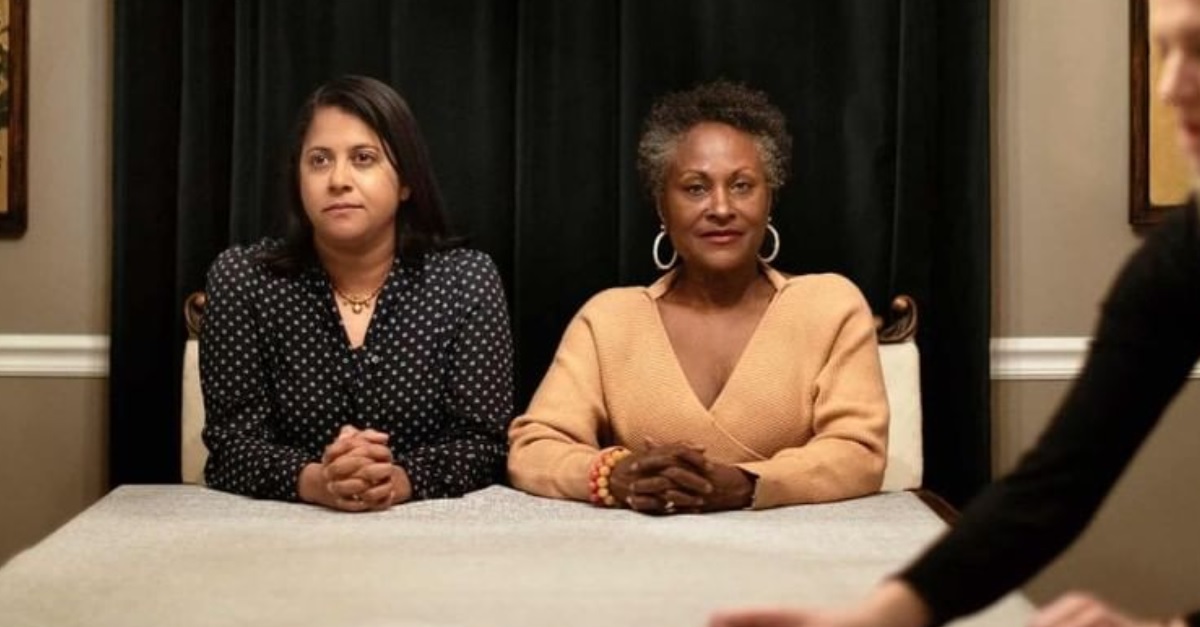
At the beginning of 2019, Regina Jackson and Saira Rao had an amazing idea. They'd begin hosting dinners that would help participants discuss some of the biggest topics that people are often told to keep quiet. Sure, race and politics might not seem like appropriate dinner table topics at first — but it's important to discuss. With people circled around a table facing each other and with food on their plates, the conversations are actually easier and more personal over dinner.
Their idea turned into Race 2 Dinner, a Denver-based organization that sets up conversational dinners for groups between eight and 10 people. The reservations are primarily for white women. At the dinner, participants are paying to have their racist beliefs changed.
Many white women might feel as if the title of "racist" is too harsh. But many were taught racist beliefs that they deemed as true at an early age. When a belief is so deep-rooted, it can often be hard to shake. That's why for many, these dinners can truly be life-changing.
At first, the dinners were a private thing that Regina and Saira started up. But eventually, more people learned about them and wanted to participate.
The dinners have also managed to adapt to fit these changing times. Instead of having them in person, the organization is facilitating digital dinners. While food is a big part, obviously the conversation that happens between the women is what's really important.
So what happens at these dinners? Regina and Saira open up the floor to their guests to talk about racist beliefs they may have. The mood is welcoming, since they're trying to inspire change — not just start fights. As the women talk, the hosts take these beliefs and see where they fit in our white patriarchal system.
Oddly enough, the idea started because white women wanted to talk to them about their nonracist beliefs. Regina is a Black woman who was born in the 1950s, when she had even fewer rights. Saira is a first-generation Indian American.
"I had a white woman friend and she said, 'You know I'm just done with Saira, she's always against white people this and white people that,'" Regina said to Today. Regina told Saira, who told her that she would have a big discussion as to why this was important — but that more women needed to attend, to really get the message out.
Thus, an organization was born. But just because they've created a welcoming way to communicate and help transform people's thoughts, it doesn't mean that they don't have ground rules to keep everybody feeling safe. For one, the dinners are for women only, including those who identify as a woman.
Just for making such an educational service available, Saira and Regina have gotten their fair share of death threats. So by setting this limit, they're trying to make their space a little safer for those who would like to attend. Guests are also required to read a book to help aid in their discussion.
While many of the same lessons are taught during these dinners, each one is unique in its own way. Sometimes, the hosts try to talk about more comfortable topics at first, just to put attendees at ease. For many women in general, we were told at a young age that race wasn't a good dinner topic — so the dinners can often require a warmup.
As they told Today, one of their first warmup conversations was about yoga. They noticed that a yoga instructor was present at the dinner, and they figured it'd be a good topic of discussion. As it turns out, even a popular workout career could have racism attached to it.
"(The dinner) starts off, Saira says something about yoga and how yoga is cultural appropriation and yoga owners here in the U.S. do not hire black and brown Indian women to teach. One woman got mad and said, 'You need to take that back!' But the yoga instructor said, 'No, you're right,'" said Regina. For many guests, it's eye-opening to have these revelations for the first time.
Saira states that as a host, she's not doing a lot of the talking. Instead, she and Regina are just leading the conversation as it happens. "This is a very interactive thing," Saira stated. "We speak very little. Really (we) ask questions and force the white women to confront their own racism." While it may be uncomfortable at times, discomfort is a good way to bring change.
It's also important for guests to ask themselves why the topic is so uncomfortable, when it's something that Black women and women of color need to face daily. For the duo, business has been booming — even with the sessions happening over Skype. And they do make sure to charge for the experience. Seeing the amount of white women who inquire and then ignore them after learning the fee is something both women have kept tabs on.
"(White women) will reach out via email and once we follow up, they'll ghost altogether or ghost after hearing the cost," Saira said. "For many, their 'activism' is hitting send on the email." In February, the two-hour dinner event was $5,000 for a large party. But that fee goes more into the organization and not on the food itself.
It may seem steep, but for some, it can be the only way to confront past racist beliefs. Aside from helping build their organization, the fee is likely how Regina and Saira know that their dinner guests are serious about making big changes. When someone pays that amount to change their point of view, you know they want to make improvements as a person.
It also helps cover travel. Prior to travel restrictions, the pair went all over the globe to offer both dinners and consultations. They've made it their job to provide the education that so many of us didn't get in school. And hopefully, their efforts are helping white women realize how privileged their lives have really been.




